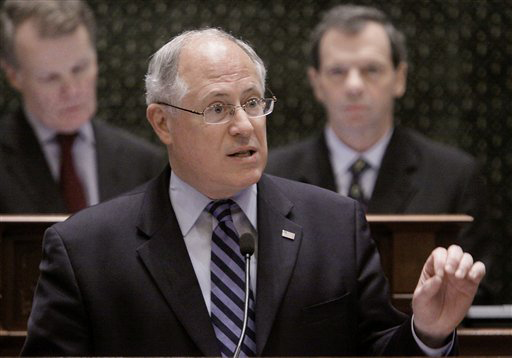Quinn plans to increase income tax

Illinois Gov. Pat Quinn delivers his State of the Budget Address to a joint session of the General Assembly Wednesday on the House floor at the Illinois State Capitol in Springfield. If Quinn wants to raise income taxes, he must convince skeptics that it’s the only remaining solution to the state’s budget problems, and that means demonstrating that he’s getting spending under control.
March 19, 2009
Ill. Gov. Pat Quinn on Wednesday announced his much-anticipated budget for fiscal year 2010, which some experts are saying could generate some controversy among taxpayers.
“To be direct and honest, our state is facing its greatest crisis in modern times,” Quinn said during the speech.
The governor hopes the General Assembly will pass a $53 billion budget that is based on “reform, responsibility and recovery.” Quinn reduced the budget from the previous year by cutting spending in areas he deemed “non-essential.”
Quinn also wants to raise the income tax, the corporate income tax and the cigarette tax, a move Institute of Government and Public Affairs director Robert Rich called controversial.
The state is currently facing an $11 billion deficit for fiscal year 2009 and 2010, the result of a downtrodden national economy, Quinn said.
Get The Daily Illini in your inbox!
“This, along with poor fiscal discipline by previous administrations, has left us in a dire financial situation,” Quinn wrote in a letter to members of the General Assembly.
Rich said it was the most important budget speech given in Illinois since former Gov. Rod Blagojevich’s first budget speech. Rich said citizens are looking to see how Quinn will handle the deficit.
“There will be a large amount of debate over the tax proposals,” he said.
Rich said he thinks the budget can help the state alleviate its debt and get back on a solid economic track in three years.
The plan creates new jobs and includes the first capital bill in Illinois in the last decade, Rich said. The capital bill would allow for renovation and upkeep of structures like buildings, roads and bridges. Rich said Quinn’s budget plan differs from plans offered by Blagojevich because of the capital bill and the increase in higher education funding.
Local state Rep. Naomi Jakobsson said the plan was well received and members of the legislature now know where the governor stands. She said it is important to keep in mind the governor has only made a proposal.
“Now we know what the Governor would like to plan,” Jakobsson said. “It’s not a budget yet.”
University spokesman Tom Hardy said Quinn’s proposed budget will help the University system.
“It’s a budget that’s good for higher education in Illinois and the University of Illinois,” Hardy said.
Don Sevener, deputy director for external relations for the Illinois Board of Higher Education said the budget allocates $40 million more for higher education than the previous budget did.
“We love the governor’s budget, it’s a very good budget for higher education,” Sevener said. “We think it’s a very good budget in a very difficult time.”
The budget still has to be approved by the state legislature and Hardy encouraged students, faculty and alumni to express their support for it. The University does not expect to know if the budget will be approved until around Labor Day. Rich said the General Assembly will take action on the proposal before the current session ends on May 31. He said he expects the majority of the plan to pass, although the Governor may not receive all of the tax increases he wants. Jakobsson said she expects the both houses and the governor to work together to create the budget.
Rich said that Quinn is correct in telling the General Assembly that not passing this plan will lead to necessary cuts in education, as well as health care.
Hardy said the budget allows for additional operating funds and financial aid. Quinn also proposed money for higher education special projects, which would include renovating Lincoln Hall. The governor has been on campus and took a tour of Lincoln Hall.
Hardy said one year’s budget cannot be used to judge a trend in funding but this budget is a halt to the trend of decreasing higher education funding in Illinois.
“There’s no question that Gov. Quinn supports higher ed,” Hardy said. “We had some expectation that there would be good news here today.”






